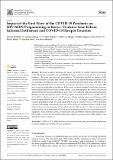Impact of the First Wave of the COVID-19 Pandemic on HIV/AIDS Programming in Kenya: Evidence from Kibera Informal Settlement and COVID-19 Hotspot Counties
View/
Publication Date
2021-06-03Type
Article, Journalviews
downloads
Metadata
Show full item recordCitation
Muhula S, Opanga Y, Oramisi V, Ngugi C, Ngunu C, Carter J, Marita E, Osur J, Memiah P. Impact of the First Wave of the COVID-19 Pandemic on HIV/AIDS Programming in Kenya: Evidence from Kibera Informal Settlement and COVID-19 Hotspot Counties. Int J Environ Res Public Health. 2021 Jun 3;18(11):6009. doi: 10.3390/ijerph18116009. PMID: 34205036; PMCID: PMC8199875.
Abstract/
The study sought to determine the impact of COVID-19 on HIV/AIDS programming in the Kibera informal settlement and COVID-19 hotspot counties during the first wave of the pandemic. The study was conducted in two phases. The first phase entailed the analysis of HIV care and treatment secondary data (2018–2020) from the Kenya Health Information System. In the second phase, a prospective cohort study was conducted among people living with HIV in the Kibera informal settlement. A total of 176 participants aged 18 years and above accessing HIV services at selected healthcare facilities in Kibera were randomly sampled from facility electronic medical records and followed up for three months. Socio-demographics and contact details were abstracted from the records and telephone interviews were conducted with consenting participants. Results from the retrospective review of HIV program data indicated a 56% (p < 0.000, 95% CI: 31.3%–62.8%) reduction in uptake of HIV services. Clients starting antiretroviral therapy (ART) reduced significantly by 48% (p < 0.001, 95% CI: 35.4%–77%) in hotspot counties. However, preexposure prophylaxis uptake increased significantly by 24% (p < 0.019, 95% CI: 4%–49%). In Kibera, 14% reported missing medications at the onset of the COVID-19 pandemic because of lack of food (38%) and government measures (11%), which affected ART access; 11% did not access health facilities due to fear of contracting COVID-19, government regulations and lack of personal protective equipment. Socioeconomic factors, food insecurity and government measures affected uptake of HIV/AIDS services; hence, the need for scaling up measures to increase access to HIV/AIDS services during the onset of pandemics.
Subject/
COVID-19; HIV/AIDS; Antiretroviral therapy; Food security; Pre-exposure prophylaxis; Lockdown measures; Personal protective equipment
Further Details
Copyright: © 2021 by the authors. Licensee MDPI, Basel, Switzerland. This article is an open access article distributed under the terms and conditions of the Creative Commons Attribution (CC BY) license (https:// creativecommons.org/licenses/by/ 4.0/).
Publisher
MDPICollections
- General - GEN [367]

